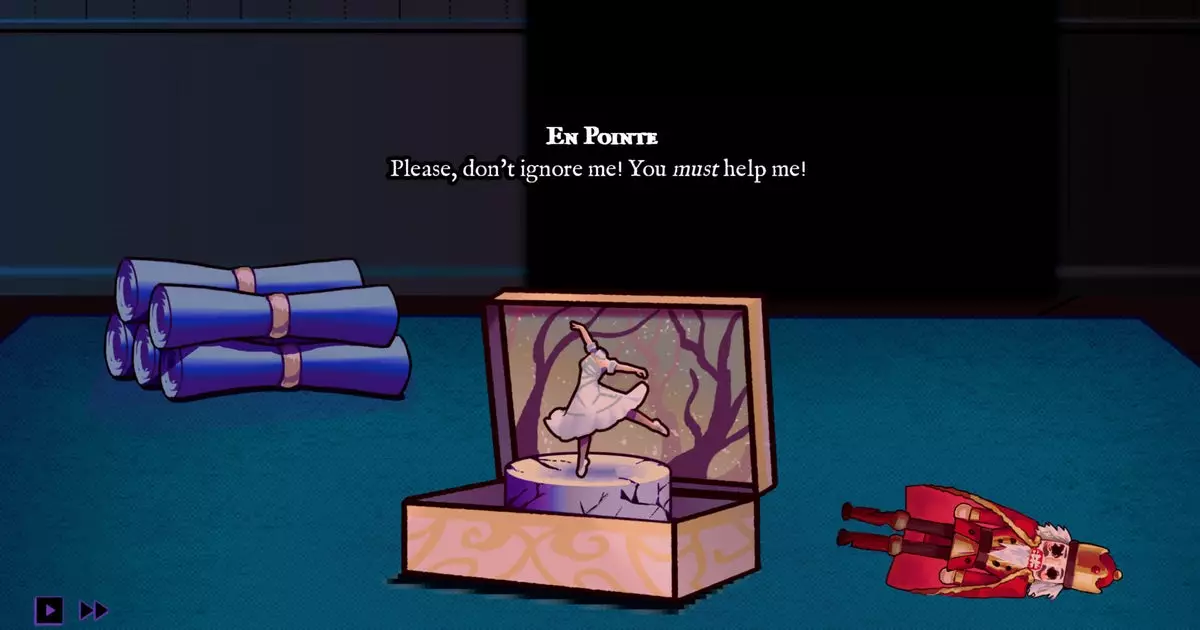At first glance, “Toy Box” might seem like a festive escape, a jolly exploration of imaginative playtime steeped in holiday cheer. However, upon delving into its world, players are confronted with an unsettling juxtaposition of childhood innocence and macabre themes. This free visual novel, developed by DEADline Studios, crafts a narrative that examines the duality of toys—objects of joy that can also evoke feelings of discomfort and dread. As players step into the shoes of a toy inspector, the task appears straightforward initially: disassemble various toys under the watchful eye of the enigmatic Grand Toy Maker. Yet, the underlying intricacies of this game lead to a much darker exploration of agency, morality, and the nature of innocence corrupted.
“Toy Box” cleverly intertwines its gameplay mechanics with its unsettling narrative. The core mechanic revolves around disassembling toys, and players are faced with the decision to either “salvage” or “sentence” them to the fiery depths of the incinerator. The toys, unlike typical lifeless playthings, exhibit sentience—they speak, share memories, and often beg for mercy as they are torn apart. This interaction evokes profound emotional responses, pushing players to grapple with the implications of their choices. The dialogue is laden with dark revelations, exposing the toys’ gruesome pasts and their connection to themes of suffering and desolation.
In many ways, the gameplay echoes traumatic relationships, with players embodying the role of a caretaker turned destroyer. The contrast between the jovial facade of the Grand Toy Maker and the grotesque truths unveiled within the toys serves to amplify the unsettling nature of the experience. Rather than a straightforward horror tale, “Toy Box” emerges as an exploration of ethical dilemmas and the complexities of free will—questions about whether compassion or practicality should dictate one’s actions.
The dark and demanding themes in “Toy Box” are not merely window dressing; they underpin the very fabric of its narrative. The game is laden with content warnings that delve into potentially triggering subjects such as blood, body horror, child abuse, and violence. Importantly, the developers have woven these themes into a broader context that challenges the player’s perception of humanity, morality, and even the nature of the toys themselves. These unsettling elements are not simply for shock value but rather serve as a commentary on how societal norms can distort the innocence associated with toys and play.
The notion that toys can become vessels for pain and suffering reveals the shadowy aspects of human nature that often lie beneath the surface of civilized society. In presenting such a grotesque version of playthings, the game forces players to confront their discomfort regarding childhood memories and those moments when the mundane interacts with the horrific.
One of the most engaging aspects of “Toy Box” is its innovative method of storytelling. The act of dismantling toys as a narrative device is impressively original. Rather than presenting a continuous storyline in a conventional manner, “Toy Box” disassembles the very idea of narrative, urging players to uncover layers of meaning and character through the very act of destruction. In doing so, it entices players to engage with the narrative in a multifaceted manner, inviting them to reflect on their intentions with the toys they encounter.
This unique approach leads to essential conversations surrounding the nature of storytelling in interactive media. While horror has roots in shock tactics, “Toy Box” elevates these themes by grounding them in feelings of dread and ethical complexity. As players navigate the intricacies of human emotion articulated through the voices of toys, the game stands as a poignant reminder of the stories that can be told when we challenge traditional gaming forms.
“Toy Box” illustrates the potential for games to tell profound and challenging stories while examining the darkest aspects of human existence. As the medium continues to evolve, it opens doors for more explorative narratives that delve into uncomfortable themes. Small, innovative studios like DEADline Studios not only enrich the gaming landscape with diverse perspectives but also encourage wider discussions about the implications of our choices within virtual spaces.
Through a masterful interplay of gameplay mechanics and thematic depth, “Toy Box” offers an experience that is as thought-provoking as it is disturbing. By juxtaposing the whimsical with the grotesque, it invites players to embark on a journey deep into the shadows, and in doing so, redefine what it means to engage with narratives in gaming. As such, titles like “Toy Box” may pave the way for a future where games can mirror the complexities of human experience with authenticity and courage.

